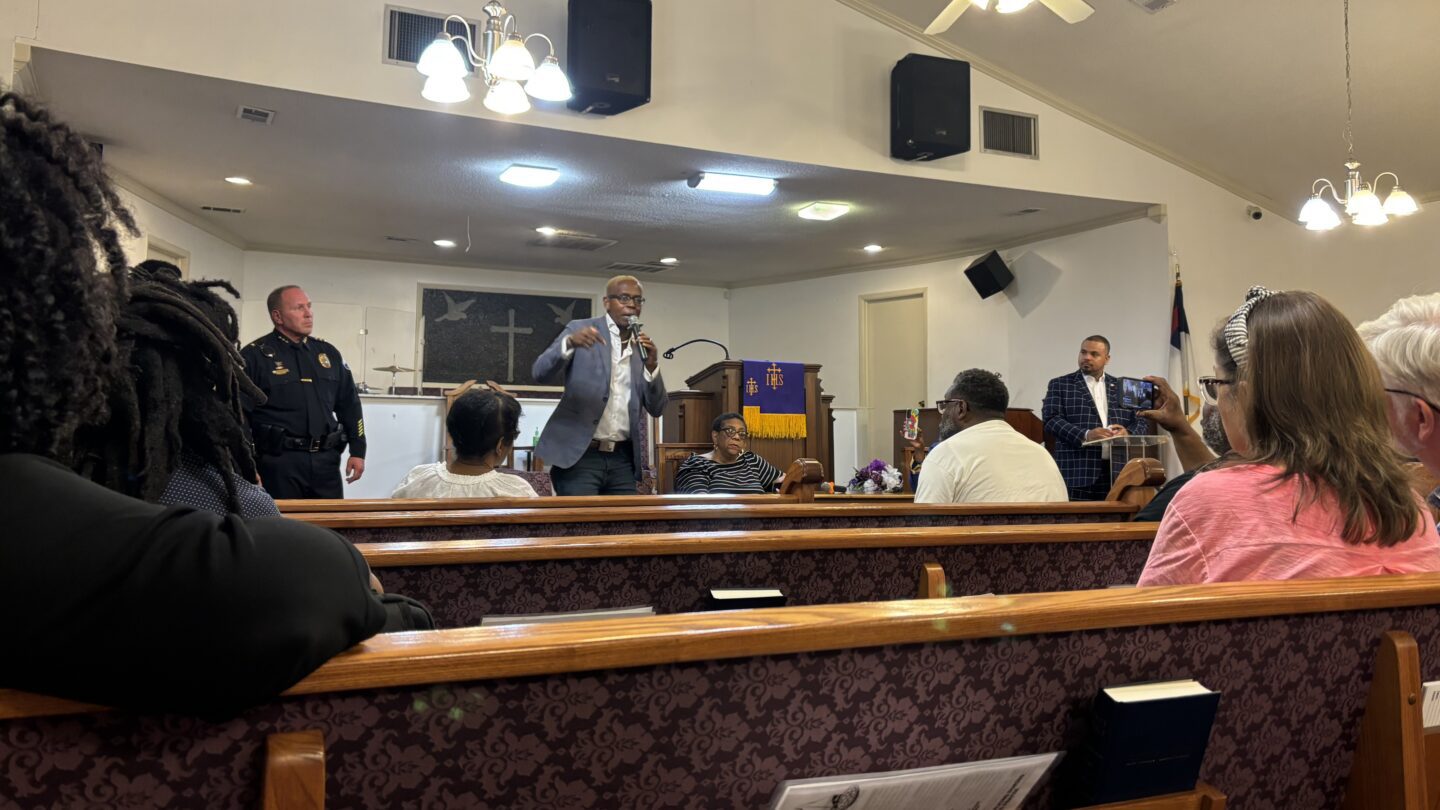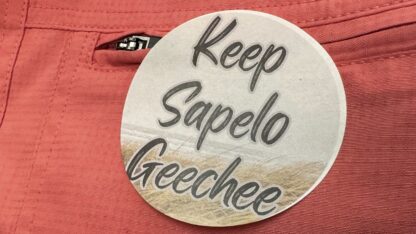Update: After publication of the story, Chatham County Coroner David Campbell responded to The Current’s requests for information. Campbell provided the identity of the teenager killed in a shooting. The story was updated on July 25 at 4:30 p.m. to reflect that.
It took a 16-year-old’s death in Jackson Park to bring Savannah’s police chief to the neighborhood association meeting.
Two shootings over three days in July — one that killed the teenager — alarmed longtime residents in midtown’s historic Black neighborhoods of Cann Park and Jackson Park
Homeowners, business owners, social workers and parents felt something had fundamentally shifted. Their youth are troubled and in trouble. They wanted to know what more the Savannah Police Department and they themselves could do to make an impact.
“You have a lot of teenagers walking around here with guns,” one man who spoke at the July 11 meeting said to police leaders. “What can y’all do to prevent things from happening, before these kids shoot someone?”
The question brought more than 30 people to fill the purple-velvet pews of First Nazareth Missionary Baptist Church. The answers SPD Chief Lenny Gunther gave filled some residents with hope and agency, but left others shaking their heads in despair. His recipe — more collaboration and reporting by residents about bad apples in their neighborhoods — many residents said was aspirational, rather than realistic, and reflects the thorny challenges faced by Savannah residents and their public servants scared and fed up with gun crime.
Gunther and his top deputies took suggestions and questions for nearly two hours, with each participant desperate for a solution.
Gunther pushed for more avenues for anonymous reporting by residents as a way to find the people using guns illegally. One way was registering residential surveillance cameras with the city police department, through its Fusus camera technology. That would allow detectives speedy access to video footage when a nearby crime occurs, he said.
“Public safety is a public responsibility,” Chief Gunther said. “But at the same time, some people don’t want police to knock on the door at all times in the night and everyone’s seeing it and we get that.”
Engagement vs. enforcement
Cann Park and Jackson Park, separated by 48th Street, share a neighborhood association and a common history. Cann Park produced civil rights leader Robbie Robinson, who was murdered in 1989 for the work he did. Both neighborhoods border Beach High School, one of the first schools for freed Black Georgians after slavery.
According to the 2020 Census, the neighborhoods (including some blocks south of Jackson Park in its analysis) are about 60% Black and 27% white. More than a quarter live in poverty.
Although young people are alleged to be responsible for most of Savannah’s gun violence and gunshot victims, the people in attendance at the July neighborhood association meeting skewed much older. They brought diverse perspectives, along with a shared frustration.
The conversation kicked off with complaints about truancy, blighted and unoccupied houses, and a lackluster city response as contributing to the surge in gun crime.
Those vacant houses allow for young people to use “that property in an illegal way,” one older resident said.
Even for neighbors in positions of power, like Jackson Park resident and State Sen. Derek Mallow, frustrations boiled over.
Mallow said children today who have firearms don’t engage with institutional authority figures like they once did. He knows because he tries.
When Mallow is out mowing his lawn, he threatens to call mothers on kids he knows need to be in school or programs, but they run away before he can call, he said.
“It’s not as easy as engaging with the young people because we do engage with the young people. But when you got a gun, and you know that this person is a state senator, this person is a police officer, they’re not going to come and talk to you,” Mallow said.
One Cann Park/Jackson Park resident, Craig Carter, responded to Mallow incredulously.
“They’re not going to talk to you. They’re not going to talk because they don’t trust these folks,” he told the state senator while pointing at the police officers. “That’s why they have guns.”
Carter said what it comes down to is Savannah Police Department officers getting out of their patrol cars and engaging with neighbors.
In a baggy yellow shirt and glasses, Carter spoke with the confidence of someone who engages with young people who distrust the police. He said they won’t talk directly to police officers, but they’ll listen to the trusted community elders, who will inform young people where to talk to the police discreetly.
“If you all feel you’re going to be in a response position all the time, then these meetings are for naught,” he said.
Push for surveillance
Chatham County Coroner David Campbell identified the 16-year-old who was killed as Lee Eddis Tyson of Savannah. Campbell was unsure if he lived in the Cann Park neighborhood.
“It was an honor and a blessing to know and work with Lee Eddis. He brightened our classroom every time he walked through the door,” wrote one of Tyson’s Savannah public school teachers on his obituary page.
The homicide was not brought up in the meeting but loomed over discussions of solutions. SPD has made an arrest in the case.
Midway through the meeting, an unlikely cheerleader for increased SPD surveillance took the microphone: pizza shop owner James Bennett.
Bennett immigrated from Jamaica and founded the successful business, Kool Vibes Pizza, on Montgomery Street.
Bennett said he pays 15-18 young people to do work for him at a rate of $10/hour at an apartment building that he owns, his restaurant and a business he described as an insurance company. They get off the street and “learn how to create (their) own income,” he said. “I wasn’t scared to embrace them.”
He told his neighbors that his Westlake apartment complex had multiple cameras and that he was happy to cooperate with police.
“Every single police officer can come to my apartment complex and pull the camera systems. And I give it to them. We have solved several crimes. No more stolen cars, there’s no more murders,” Bennett said. He boasted that crime was down “to nothing.”
That’s not completely true, according to police statistics. The apartments have experienced at least one homicide last summer and a shooting in November, according to posts by the Chatham County Police Department.
‘Not what they’re looking for anymore’
Towards the end of the meeting, Savannah writer Christopher Woolf, who at 35 was one of the youngest people there, got his chance to speak. He looked on from written notes and adopted a rhythmic cadence.
Woolf said that answers to gun violence were not going to be found through the police.
“More police, more jail, more surveillance has not been the answer because year-over-year as I’ve been alive, we’ve had more of those things and we’ve also had more violence,” Woolf said. “So clearly, putting these young men in jail is not helping.”
The last speaker, a woman, talked about moving from the suburbs of Savannah to Cann Park.
She said community leaders are not meeting young people where they are. Change would begin with neighbors getting their heads out of the sand, talking to young people with respect and encouraging them away from guns and violence.
“Back in the day the community center did it for the kids, it gave them somewhere to go,” she said. “That’s not what they’re looking for anymore.”
Conversations and solutions
The meeting ended around 7:45pm. They were borrowing the church space, and it was needed for another event.
Bennett left the meeting in a silver luxury car. The assistant police chief stayed longer to talk outside the church. Many attendees walked back to their homes to get out of the heat.
Keyshawn Housey, another young person, went with Woolf to the meeting but did not speak. Days later, he texted his thoughts to The Current. He urged the city council to host more necessary conversations like this one.
But he feared it may have been for nothing given one major missing component.
“The group of people who are currently most affected by this wave of gun violence (young people aged 13-19) were not represented at all,” Housey wrote. “How can anybody come up with a good faith solution without their input?”
This story was provided by WABE content partner The Current.









